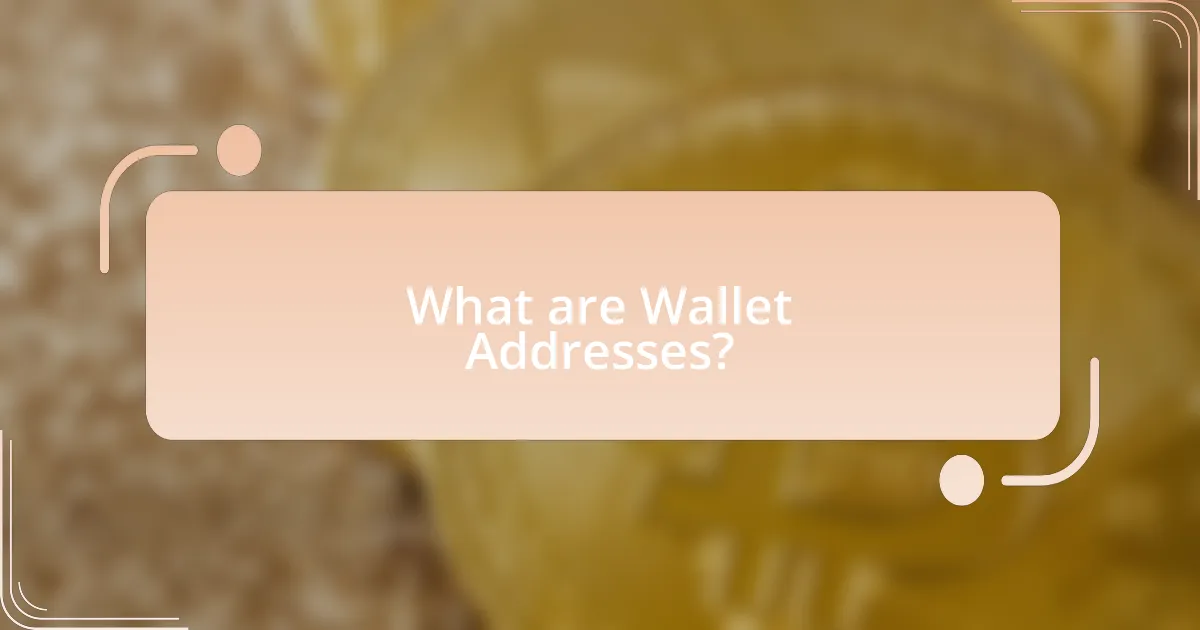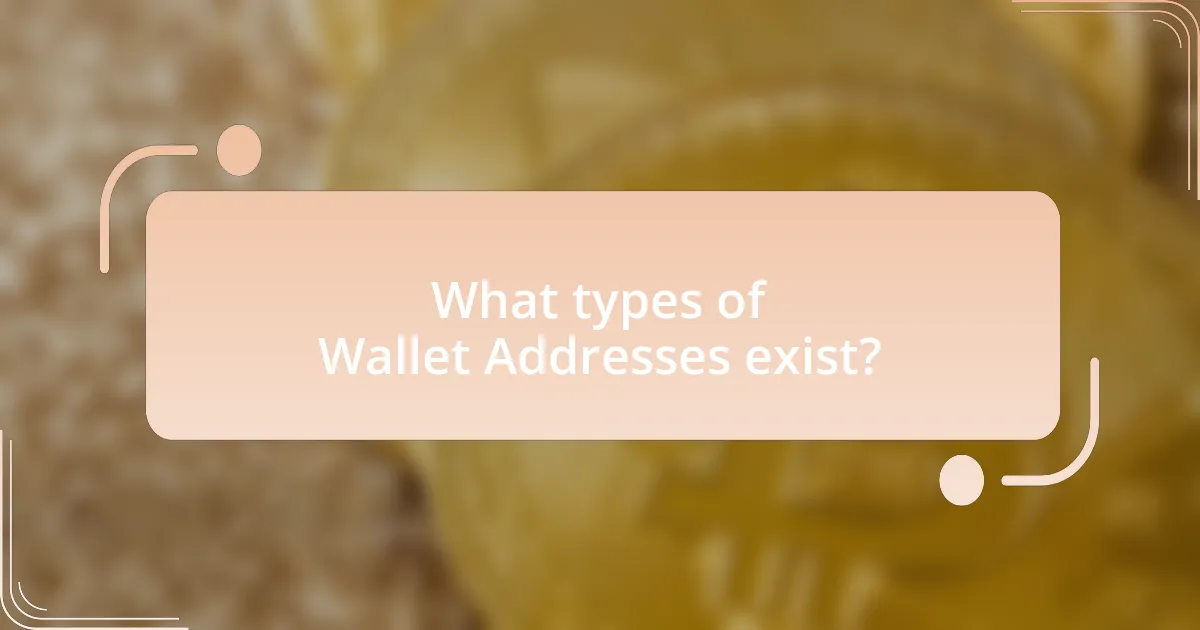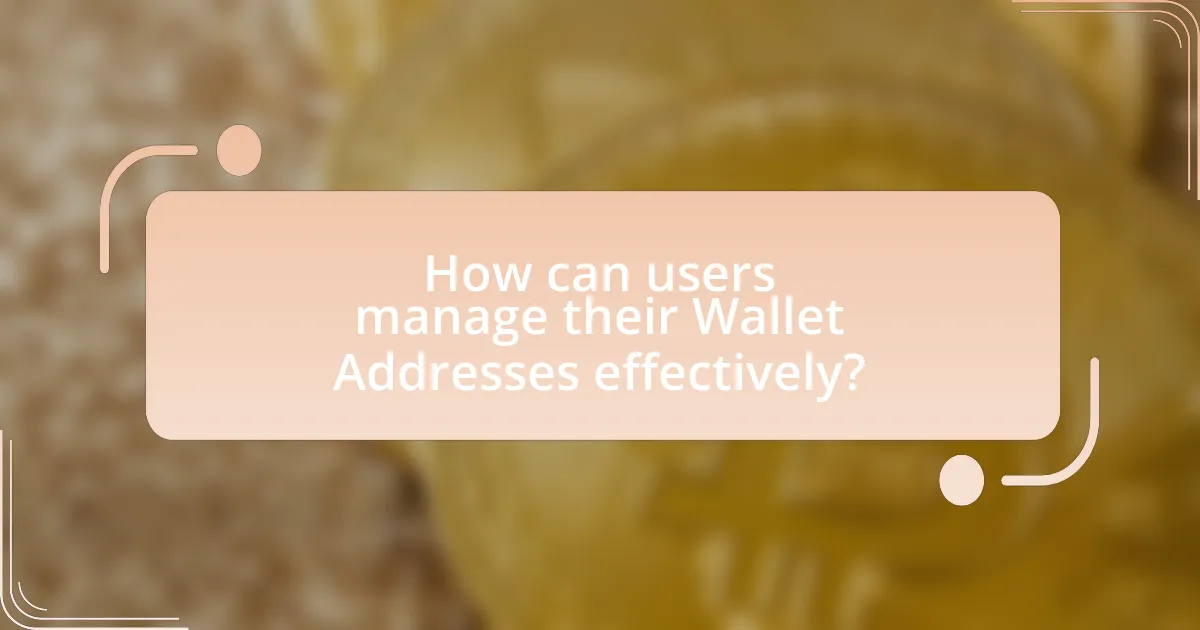Wallet addresses are unique identifiers in cryptocurrency networks that enable the secure sending and receiving of digital assets. This article explores the generation of wallet addresses through cryptographic algorithms, the roles of private and public keys, and the importance of wallet addresses in maintaining transaction integrity within decentralized systems. It also discusses the various types of wallet addresses, the differences between cryptocurrencies like Bitcoin and Ethereum, and best practices for managing and securing wallet addresses. Additionally, the article highlights common risks associated with wallet addresses and provides troubleshooting tips for users facing issues with transactions.

What are Wallet Addresses?
Wallet addresses are unique identifiers used in cryptocurrency networks to facilitate the sending and receiving of digital assets. Each wallet address corresponds to a specific wallet, which stores the user’s private and public keys, enabling transactions on the blockchain. For example, Bitcoin wallet addresses are typically represented as a string of alphanumeric characters, allowing users to securely transact without revealing their identity. The uniqueness of each wallet address ensures that funds are directed to the correct recipient, thereby maintaining the integrity of transactions within the decentralized system.
How are Wallet Addresses generated?
Wallet addresses are generated through a process that involves cryptographic algorithms, specifically using public key cryptography. Initially, a user creates a private key, which is a randomly generated number that serves as the foundation for the wallet. From this private key, a corresponding public key is derived using elliptic curve multiplication, a mathematical operation that is computationally infeasible to reverse. The wallet address itself is then created by applying a series of hashing functions, such as SHA-256 followed by RIPEMD-160, to the public key. This process results in a shorter, more manageable string of characters that represents the wallet address, ensuring both security and ease of use. The validity of this method is supported by the principles of cryptography, which ensure that the relationship between the private key and the wallet address is secure and unique.
What algorithms are used in the generation of Wallet Addresses?
Wallet addresses are generated using cryptographic algorithms, primarily the Elliptic Curve Digital Signature Algorithm (ECDSA) and Secure Hash Algorithm (SHA-256). ECDSA is utilized to create a public-private key pair, where the private key is kept secret and the public key is derived from it. The public key is then hashed using SHA-256 followed by a process involving the RIPEMD-160 algorithm to produce the final wallet address. This method ensures that wallet addresses are unique and secure, making it difficult for unauthorized parties to access the associated funds.
What role do private and public keys play in Wallet Addresses?
Private and public keys are essential components of wallet addresses, serving distinct but interconnected roles in cryptocurrency transactions. The public key generates the wallet address, which is shared with others to receive funds, while the private key is a secret that allows the owner to access and manage the funds associated with that wallet address. The security of the wallet relies on the private key, as it must remain confidential; if compromised, unauthorized access to the funds can occur. This relationship ensures that only the holder of the private key can authorize transactions from the wallet address, thus maintaining the integrity and security of the cryptocurrency ecosystem.
Why are Wallet Addresses important in cryptocurrency transactions?
Wallet addresses are crucial in cryptocurrency transactions because they serve as unique identifiers for sending and receiving digital assets. Each wallet address corresponds to a specific wallet, allowing users to securely transact without revealing personal information. The decentralized nature of blockchain technology ensures that these addresses facilitate transparency and traceability of transactions, as all transfers are recorded on a public ledger. This system prevents double-spending and enhances security, as each transaction is verified by network participants. The importance of wallet addresses is underscored by their role in maintaining the integrity and functionality of cryptocurrency ecosystems.
How do Wallet Addresses ensure security in transactions?
Wallet addresses ensure security in transactions by providing a unique identifier for each user, which is essential for verifying ownership and preventing unauthorized access. Each wallet address is generated through cryptographic algorithms, making it extremely difficult to forge or guess. This cryptographic foundation ensures that only the owner of the private key associated with a wallet address can authorize transactions, thereby safeguarding funds against theft. Additionally, the use of public and private key pairs enhances security; the public key is shared openly, while the private key remains confidential, ensuring that only the rightful owner can initiate transactions.
What risks are associated with using Wallet Addresses?
Using wallet addresses carries several risks, including exposure to hacking, loss of funds, and privacy concerns. Hacking incidents can lead to unauthorized access to wallets, resulting in the theft of cryptocurrencies; for instance, the 2014 Mt. Gox hack resulted in the loss of approximately 850,000 Bitcoins. Additionally, if users lose access to their private keys, they may permanently lose their funds, as there is no recovery mechanism in decentralized systems. Privacy risks arise because wallet addresses are often publicly visible on blockchain networks, making it possible for malicious actors to track transactions and link them to individuals, potentially leading to targeted attacks or identity theft.

What types of Wallet Addresses exist?
There are several types of wallet addresses, primarily including Bitcoin addresses, Ethereum addresses, and multi-signature addresses. Bitcoin addresses can be categorized into three formats: P2PKH (Pay-to-Public-Key-Hash), P2SH (Pay-to-Script-Hash), and Bech32 (native SegWit addresses). Ethereum addresses are typically represented in hexadecimal format and start with ‘0x’. Multi-signature addresses require multiple private keys to authorize a transaction, enhancing security. Each type serves specific functions within their respective blockchain ecosystems, ensuring compatibility and security for transactions.
How do different cryptocurrencies utilize Wallet Addresses?
Different cryptocurrencies utilize wallet addresses as unique identifiers for users to send and receive digital assets securely. Each cryptocurrency, such as Bitcoin, Ethereum, and Litecoin, generates wallet addresses through cryptographic algorithms, ensuring that each address is distinct and linked to a specific public-private key pair. For instance, Bitcoin addresses typically start with a ‘1’ or ‘3’, while Ethereum addresses begin with ‘0x’, reflecting their respective blockchain protocols. This structure not only facilitates transactions but also enhances security by allowing users to maintain anonymity, as wallet addresses do not inherently reveal personal information. The utilization of wallet addresses is crucial for the functioning of decentralized networks, enabling peer-to-peer transactions without the need for intermediaries.
What are the differences between Bitcoin and Ethereum Wallet Addresses?
Bitcoin and Ethereum wallet addresses differ primarily in their format and purpose. Bitcoin addresses typically start with a ‘1’, ‘3’, or ‘bc1’, while Ethereum addresses always begin with ‘0x’ followed by 40 hexadecimal characters. Bitcoin addresses are used for transactions on the Bitcoin network, which focuses on peer-to-peer currency transfer, whereas Ethereum addresses facilitate transactions and interactions with smart contracts on the Ethereum blockchain. The structural differences reflect the distinct functionalities of the two cryptocurrencies, with Bitcoin emphasizing value transfer and Ethereum enabling decentralized applications and programmable transactions.
How do Wallet Addresses differ between hot and cold wallets?
Wallet addresses for hot wallets and cold wallets differ primarily in their accessibility and security features. Hot wallets, which are connected to the internet, generate wallet addresses that allow for quick transactions and easy access, making them suitable for frequent trading. In contrast, cold wallets, which are offline storage solutions, create wallet addresses that prioritize security over convenience, as they are designed to protect assets from online threats. This distinction is crucial; for example, hot wallets are more vulnerable to hacking, while cold wallets are less susceptible due to their offline nature, thus providing a safer environment for long-term asset storage.
What are the common formats of Wallet Addresses?
Common formats of wallet addresses include Bitcoin addresses, Ethereum addresses, and Litecoin addresses. Bitcoin addresses typically start with a ‘1’, ‘3’, or ‘bc1’, while Ethereum addresses are 42 characters long and begin with ‘0x’. Litecoin addresses often start with ‘L’ or ‘M’. These formats are standardized to ensure compatibility within their respective blockchain networks, facilitating secure transactions and user identification.
What is the significance of Base58Check encoding in Wallet Addresses?
Base58Check encoding is significant in wallet addresses because it enhances the usability and security of cryptocurrency transactions. This encoding method reduces the likelihood of errors during address entry by eliminating visually similar characters, such as ‘0’ (zero) and ‘O’ (capital o), which can lead to confusion. Additionally, Base58Check includes a checksum that helps verify the integrity of the address, ensuring that any mistakes in input can be detected before a transaction is executed. This combination of user-friendly design and error-checking capabilities makes Base58Check encoding essential for maintaining the reliability and security of wallet addresses in cryptocurrency systems.
How do QR codes relate to Wallet Addresses?
QR codes serve as a convenient method for representing wallet addresses in a scannable format. By encoding a wallet address into a QR code, users can easily share their cryptocurrency wallet information without the need for manual entry, which reduces the risk of errors. This functionality is particularly important in cryptocurrency transactions, where accuracy in wallet addresses is crucial to ensure funds are sent to the correct destination. The use of QR codes for wallet addresses has been widely adopted in various cryptocurrency applications and platforms, enhancing user experience and transaction efficiency.

How can users manage their Wallet Addresses effectively?
Users can manage their wallet addresses effectively by employing a systematic approach that includes organizing, securing, and regularly updating their addresses. Organizing wallet addresses can be achieved by categorizing them based on usage, such as for personal transactions, business purposes, or specific cryptocurrencies. Securing wallet addresses involves using strong passwords, enabling two-factor authentication, and storing private keys in a safe location, which reduces the risk of unauthorized access. Regularly updating wallet addresses, especially after significant transactions or changes in security protocols, ensures that users maintain control over their assets and minimize exposure to potential threats. This methodical management approach is supported by best practices in cybersecurity, which emphasize the importance of organization and security in protecting digital assets.
What best practices should users follow for Wallet Address security?
To ensure Wallet Address security, users should implement several best practices. First, users must enable two-factor authentication (2FA) on their wallets, which adds an extra layer of security by requiring a second form of verification beyond just the password. Additionally, users should regularly update their wallet software to protect against vulnerabilities, as updates often include security patches.
Furthermore, users should avoid sharing their wallet addresses publicly, as this can expose them to phishing attacks or unwanted attention. Using hardware wallets for storing significant amounts of cryptocurrency is also recommended, as these devices are less susceptible to online threats compared to software wallets.
Lastly, users should create strong, unique passwords for their wallets and consider using a password manager to keep track of them securely. These practices collectively enhance the security of wallet addresses and protect users from potential threats.
How can users safely store their Wallet Addresses?
Users can safely store their wallet addresses by utilizing secure methods such as hardware wallets, encrypted digital storage, or writing them down in a safe physical location. Hardware wallets provide a high level of security by keeping private keys offline, which protects against online threats. Encrypted digital storage, such as password-protected files or secure cloud services, adds an additional layer of security by ensuring that only authorized users can access the information. Writing wallet addresses down and storing them in a safe or safety deposit box minimizes the risk of digital theft. According to a report by the Blockchain Research Institute, hardware wallets are considered one of the safest options for storing cryptocurrency-related information due to their offline nature and robust security features.
What steps should be taken if a Wallet Address is compromised?
If a wallet address is compromised, the immediate step is to transfer all assets to a new, secure wallet address. This action prevents further unauthorized access to the funds. Following the transfer, it is crucial to notify the relevant cryptocurrency exchanges and services about the compromise to protect against potential fraud. Additionally, enabling two-factor authentication (2FA) on all accounts associated with the compromised wallet enhances security. Regularly updating passwords and monitoring account activity for any suspicious transactions are also essential steps to mitigate risks. These measures are supported by the fact that compromised wallet addresses can lead to significant financial losses, as evidenced by numerous reports of theft in the cryptocurrency space.
What tools are available for managing Wallet Addresses?
Various tools are available for managing wallet addresses, including software wallets, hardware wallets, and blockchain explorers. Software wallets, such as Exodus and Electrum, allow users to create, store, and manage multiple wallet addresses conveniently on their devices. Hardware wallets, like Ledger and Trezor, provide enhanced security by storing wallet addresses offline, protecting them from online threats. Blockchain explorers, such as Etherscan and Blockchair, enable users to view and track wallet addresses and their transaction histories on the blockchain, offering transparency and verification. These tools collectively facilitate effective management and security of wallet addresses in cryptocurrency transactions.
How do wallet management applications enhance user experience?
Wallet management applications enhance user experience by providing streamlined access to digital assets and simplifying transaction processes. These applications often feature user-friendly interfaces that allow individuals to easily manage multiple wallet addresses, track balances, and execute transactions with minimal effort. For instance, a study by Statista in 2023 indicated that 70% of users prefer applications that offer intuitive navigation and quick access to essential features, which wallet management applications typically provide. Additionally, these applications often incorporate security measures such as biometric authentication and encryption, further enhancing user confidence and satisfaction.
What features should users look for in a wallet management tool?
Users should look for security features, user-friendly interfaces, multi-currency support, transaction tracking, and backup options in a wallet management tool. Security features, such as two-factor authentication and encryption, protect users’ assets from unauthorized access. A user-friendly interface ensures ease of navigation, making it accessible for both beginners and experienced users. Multi-currency support allows users to manage various cryptocurrencies in one place, enhancing convenience. Transaction tracking provides users with insights into their spending and income, which is essential for effective financial management. Lastly, backup options are crucial for recovering funds in case of device loss or failure, ensuring that users do not lose access to their assets.
What are the common troubleshooting tips for Wallet Addresses?
Common troubleshooting tips for wallet addresses include verifying the address format, ensuring the correct network is selected, checking for typos, and confirming the address with the recipient. Wallet addresses must adhere to specific formats, such as alphanumeric characters for Bitcoin or Ethereum, and using an incorrect format can lead to transaction failures. Selecting the correct network is crucial because sending funds to an address on the wrong blockchain can result in loss of funds. Typos can easily occur when copying or entering addresses, so double-checking the address is essential. Lastly, confirming the address with the recipient ensures that the funds are sent to the intended destination, reducing the risk of errors.
How can users resolve issues with sending or receiving funds?
Users can resolve issues with sending or receiving funds by verifying the wallet address for accuracy before initiating a transaction. Ensuring that the wallet address is correct is crucial, as even a single character error can lead to funds being sent to the wrong account. Additionally, users should check their internet connection and confirm that the receiving wallet is compatible with the type of funds being sent. If problems persist, consulting the customer support of the wallet service or platform being used can provide further assistance.
What should users do if they lose access to their Wallet Address?
If users lose access to their Wallet Address, they should immediately attempt to recover it using any backup methods they previously established, such as recovery phrases or seed phrases. These recovery methods are critical because they allow users to regain access to their wallets and funds. According to industry standards, most cryptocurrency wallets provide users with a recovery phrase during the initial setup, which is essential for restoring access in case of loss. If users did not create a backup, they may have limited options for recovery, as wallet addresses are typically not retrievable without the associated private keys or recovery phrases.